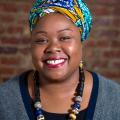I am a part of a sojourning people, a diaspora people. Taken from Nigeria to toil on the Alston plantations of America my Hausa ancestors migrated to Nigeria from the Middle East, according to scholars. In the 1960s, my maternal grandparents left North Carolina and eloped on the way to Brooklyn, New York. They were a part of the millions who left the South for Northern cities in the Great Migration. Though we call New York City our home, we are a part of a great diaspora of people taken from the continent of Africa as slaves in the trans-Atlantic slave trade.
In 1 Peter 1:17-23, Peter encourages us to live our time here as sojourners with reverent fear, remembering the sacrifice that was made for us. What does it mean to be a sojourner? It means that you are temporarily traveling through a place, and as people of faith we must remember that we are temporary residents of our respective countries because we are permanent residents of the Kingdom of God. The Apostle Peter opens his pastoral letter "to the elect who are sojourners of the dispersion.” These were Hebrews who were dispersed throughout the Roman Empire, even to the four corners of the earth.
When you are a sojourner, you may never feel at home — but you know you have a home. Who are the sojourners and the dispersed today? We must remember the 3 million refugees who have been resettled in the United States since Congress passed the Refugee Act of 1980. In January, the Pew Research Forum collected these key facts about refugees to the U.S.
Let us consider the reality of refugees in the United States. Three million refugee sojourners should be welcomed and yet in our current political environment they are being shut out.
Let us remember these refugees from across their world and their need for sanctuary as ICE agents roam our communities capturing friends and family as modern day slave catchers. How are we to welcome these sojourners in our midst?
If we remember the welcome that God gave to us, as we sojourned through life to spiritually connect to the divine, we will treat these modern-day sojourners with hospitality and love, providing sanctuary for those who are hunted by a broken immigration system.
People of faith forget that we are only sojourners on Earth, yet permanent residents of the Kingdom of God. When we forget this, we bow down to the idols of patriotism and nativism, failing to love our family members dispersed across the world. As people of faith, we have to ask ourselves: Where does our loyalty reside? With one country or with the Kingdom?
Now, I am very tied to my culture and community, but I also know that I have brothers and sisters in the spirit residing in the four corners of the earth. As the apostle Paul writes, “If one part of the body suffers, we all suffer.”
We must be balanced in our love towards our neighbors next door and towards our neighbors across the world.
On March 16th, I joined 26 faith leaders of various races and faith traditions to block traffic in front of the ICE (Immigration and Customs Enforcement) court. We prayed for New York City to be a true sanctuary city for our sojourning sisters and brothers. We were arrested as we prayed and chanted. We spent about seven hours in jail.
We realized we were just sojourning through the prison system, but that our immigrant and incarcerated brothers and sisters didn't. They remain in the system locked away due to political dysfunction, classism and racism.
As believers, we aren't called to hold our citizenship in any nation above our citizenship in the Kingdom of God. We are called to welcome the stranger and called to provide sanctuary to the sojourners — realizing that regardless of borders, walls, bans, or political climate, we are family united by the spirit.
Remembering the words of the apostle Peter to the sojourning Hebrews dispersed due to Roman occupation:
"Now that you have purified yourselves by obeying the truth so that you have sincere love for each other, love one another deeply, from the heart."
Sincere love during these times means offering sanctuary for the sojourner, risking our congregations, and even putting our bodies on the line — knowing that our true citizenship is in the Kingdom, where no one is illegal and all are loved.
Got something to say about what you're reading? We value your feedback!

